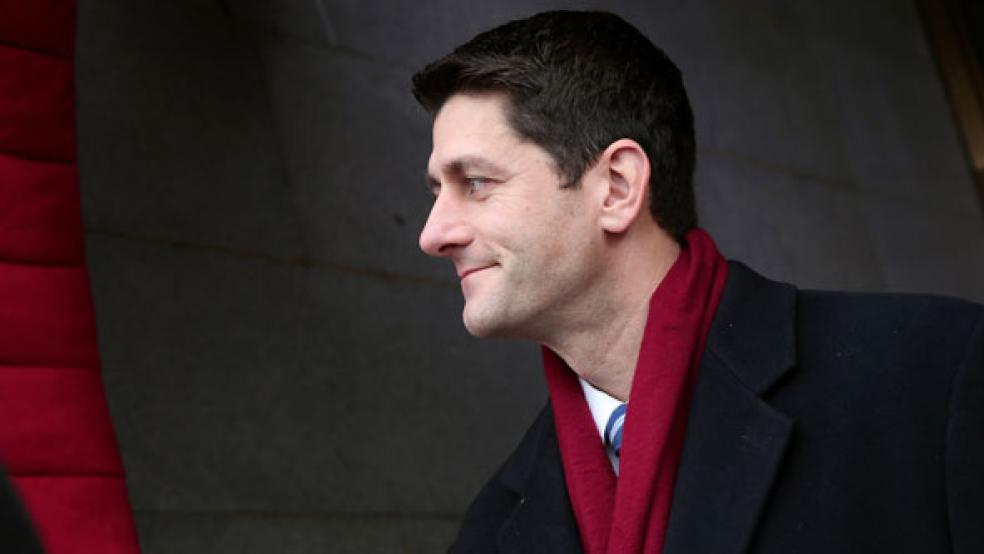Just before the House voted today to suspend the debt ceiling through mid-May, Budget Committee Chairman Paul Ryan of Wisconsin affirmed the Republicans’ determination to push through a new budget that would wipe out the deficit in ten years and reform the tax code.

The 2012 Republican vice presidential nominee acknowledged during a breakfast sponsored by The Wall Street Journal that “we do have our work cut out for us,” especially in finding additional cuts in major social programs and entitlements that would pass muster with President Obama and Senate Democrats. But he said the GOP plan to table concerns over the debt ceiling for nearly four months “will give us time to have a debate on the contrasting visions” of the Republicans and the White House.
Along with Ways and Means Committee Chairman Dave Camp, R-Mich., Ryan and other GOP leaders are trying to lay the groundwork for further changes in the tax code, despite widespread skepticism that the two parties can agree on changes beyond the New Year’s Day fiscal cliff deal. The deal extended Bush-era tax rate cuts to all but individuals making more than $400,000 a year and families making over $450,000.
House Republicans are working behind the scenes on a tax strategy designed to reduce the long term debt and lower rates by either capping or eliminating costly tax deductions for individuals or corporations, such as the write-off on mortgage interest and charitable deductions or health care insurance programs that businesses provide to their employees.
RELATED: Obama to GOP: Don’t Hold Economy Hostage
By contrast, senior Senate Democrats, including Sen. Chuck Schumer of New York, say they want to revive the budget process to pave the way for raising additional tax revenue from corporations and the wealthy. The agreement struck by Democrats and Republicans to avoid or postpone the worst effects of the fiscal cliff at the start of the year will generate about $600 billion over the coming decade – but that’s only a little more than a third of Obama’s $1.6 trillion target for new tax revenue.
TAX REFORM—WHO HAS THE PAIN, WHO GAINS?
Asked this morning how lawmakers could reconcile the conflicting interests and goals of the two parties over tax reform, Ryan replied, “They [the Democrats] already got their revenue” in the fiscal cliff deal,” and that now was the time to focus on entitlement reform and other long term savings to address the mounting national debt, which is currently at $16.4 trillion. .
“Mathematically, you can’t solve the problem through revenue [increases]. You have to solve it through entitlement reform and actual cuts,” he said.
After the breakfast, Ryan told The Fiscal Times that “I really don’t know” whether the two sides can agree on additional tax reform this year, or whether taxes will simply be talking points in the ongoing tensions between the two parties.
“What I have learned, going into these things, [is] don’t just solidify pre-conceived notions of what can be done and cannot be done,” Ryan said. “And we believe that if we start moving, that might open up a field of possibilities.”
As for whether the Republicans are finally prepared to openly target popular tax deductions for elimination or reductions, Ryan remained as cagey as he was during the presidential campaign when he refused to name even one popular tax deduction he would get rid of.
“We haven’t gotten to that yet,” he said. “We’re going to look at all the options, and we’re going to have a bunch of hearings, too. Our preconceived notion is, ‘Broad base, lower rates.’ Exactly how we do that, we haven’t figured that out.”
House Republican leaders’ decision to lift the immediate threat of a government default on its debt was widely viewed as a move to buy policymakers time to continue their arguments over spending, tax and entitlement policies without another market-rattling deadline hanging over Congress and the White House. In order to win over skeptical conservatives, House Speaker John Boehner pledged that Ryan would draft a new budget for the coming fiscal year that would wipe out deficits “within a decade.” Ryan’s previous austere budget blueprints would have taken nearly 30 years to reach balance.
The GOP proposal up for a vote today requires the Senate to draft a budget of its own by April 15 – or else senators’ pay will be withheld until they finally act.
NEW GOP TACTICS FOR THE NEXT FOUR YEARS
Boehner, Majority Leader Eric Cantor and Ryan have seemed chastened in some ways by the outcome of the November election, in which President Obama scored a solid victory over the Mitt Romney-Ryan ticket and the Democrats increased their margin of control in the Senate and cut into the House Republican majority.
Ryan suggested that, moving forward, Republicans would be much more careful in picking fights with the administration that could backfire on them.
“The way I look at it is principle and prudence,” Ryan said. “We have to exercise our principles in a prudent way with realistic expectations while being reasonable, and doing what we think is right. That means our tactics will vary but our strategy will be the same. Our strategy is to engage the Democrats on issues where we think we can improve policy, to oppose them on issues where we simply have fundamental disagreements. And the way we see it, our value add to the political system at the moment of all things is to help prevent a debt crisis.”
“It’s frustrating to see how little desire our colleagues on the other side or the president have with getting spending under control or reforming entitlements,” he added. “That to us is the most important thing because we fear a debt crisis and what that would do to the people in this nation, to our economy and the next generation.”
Ryan, who attended Monday’s inauguration, claimed Obama engaged in “shadow boxing straw men” by suggesting that Republicans want to dismantle or sharply cut Medicare, Medicaid and Social Security benefits for seniors and the poor. “When I see him erect a straw man, it shows me he is not ready to have an honest debate” about fundamental entitlement reform, Ryan said.
As for areas where he sees opportunities for the two parties to work together this year, Ryan says immigration is a good one. “I’ve long believed in immigration reform and I think there are other Republicans who do so as well,” he said. “That’s an area where Democrats have to ask themselves, do we want law to fix the problem, or are we just looking for a political issue. And I think there are a lot of good legislatures on the other side of the aisle who really want to fix this problem.”





